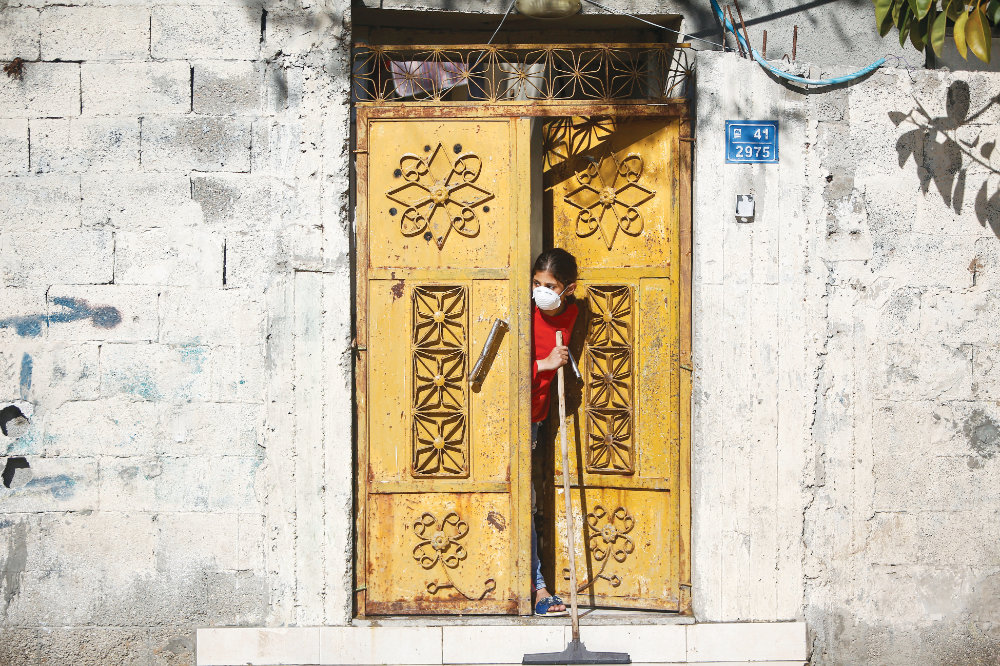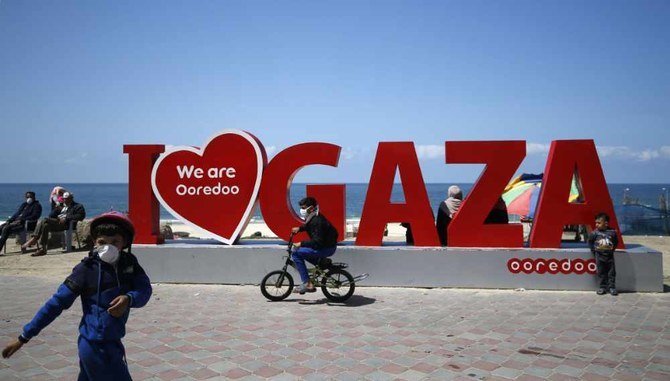GAZA CITY: As the deadly coronavirus disease (COVID-19) spreads across the Middle East, relative isolation might seem to be an advantage in keeping a community safe.
However, as the recent confirmation by Gaza’s Hamas-controlled Ministry of Heath of two COVID-19 cases in the enclave demonstrates, no population in the Middle East, or indeed the wider world, can afford to assume it is invulnerable.
Even before the global pandemic hit, the public health system in the densely populated Palestinian territory was fragile.
FASTFACT
At least 1,271 Palestinians have been admitted to quarantine centers established in the Gaza Strip.
This was only to be expected after the long years of conflict with Israel, a security cum economic blockade since 2007, and the failure of the competing Palestinian factions, Fatah and Hamas, to bury the hatchet.
Now, the tension is palpable. The police have announced the closure of cafes, restaurants and markets across the Gaza Strip. Gatherings in wedding halls and for prayers in mosques have been suspended.
The expectation is that restrictions will increase if more infections are reported.
In Israel, where the number of infections has crossed the 2,000 mark, authorities have adopted drastic measures to limit the movement of Palestinians entering the country.
The government body in charge of coordinating Israeli policy in the Palestinian territories has said all border crossings to Gaza and the West Bank will remain shut.
Anecdotal evidence would indicate a spike in demand for food and essential items across Gaza since the announcement of the two COVID-19 cases.
“We did not find medicines in hospitals before the last crisis hit Gaza,” said Ibrahim Aydiya, 44, a grocery store owner in Gaza City. “I don't know what will happen if infections spread inside the territory.”
According to Aydiya, there has been a significant increase in purchases by Gaza residents since the beginning of the month.
“I do not know what the poor are doing in Gaza, but since the announcement of the two cases, people have become increasingly interested in stocking up,” he said.
Overall, the Palestinian territories have recorded 62 COVID-19 cases, all in the Fatah-run West Bank, except the two in Gaza. At least 16 of the patients are said to have recovered.

Palestinian artists Samah Said (L) and Dorgham Krakeh paint N95 protective masks for a project raising awareness about the COVID-19 coronavirus pandemic in Gaza City on March 24, 2020. (AFP / MOHAMMED ABED)
The Ministry of Health has set up 18 quarantine centers in the Gaza Strip, since the beginning of March. All arrivals from the Rafah and Erez crossings are placed in quarantine for 14 days as a precaution.
At least 1,271 Palestinians have been admitted to these centers, according to official sources.
On March 22, the Ministry of Health said the two Palestinians in question had recently returned from Pakistan through the Rafah crossing between Egypt and Gaza and were placed under quarantine after they showed COVID-19 symptoms.
Many among Gaza’s 2 million inhabitants are not surprised that despite their insular existence, they are not immune from the unfolding global health crisis.
“It is impossible for Gaza to be completely isolated, and the spread of the infection across the world has been very fast,” said Fathi Lafi, a 52-year-old Palestinian.
“We do not live alone in this world. Our exposure to the coronavirus risk was limited, and this bought us time, but the virus has now reached our community.”
On the question of what Gaza can do under the circumstances, Lafi’s response summarized the attitude of a large swathe of Gaza’s population.
“The world does not care about us,” he told Arab News. “We should only care about ourselves.”
Help and advice are on hand, however. The World Health Organization (WHO) has assisted the Palestinian Authority’s Ministry of Health in the form of protective clothing for health workers to handle people infected with COVID-19.
In Gaza, the agencies dealing with public health have been supplied test kits for infection detection.
Speaking to Arab News, Abdel Nasser Soboh, director of the WHO office in Gaza, said the UN is providing assistance to health authorities in the territory as it grapples with the emergency.
He said his office is in the process of providing ventilators and intensive care beds to support the health sector as it prepares for the worst-case scenario.
According to Medhat Abbas, director-general of primary care at the Ministry of Health, the state of the medical infrastructure is precarious owing to years of restrictions.
“Over the past several years, we have called on international institutions and the world to help us, but the response has been limited,” he told Arab News.
“We are in a difficult situation. Our capabilities are limited. However, we are in a state of emergency now and, so far, things are under control.”

The territory’s first cases arrived in Gaza from Pakistan. (AFP)
Abbas said Gaza has 40 Intensive Care Unit beds in normal times, adding that in a public health emergency, the number could be increased to a maximum of 100.
Referring to the two confirmed patients, he said: “They are in quarantine. All those who were in contact with them have been quarantined. There is no need for panic at this stage.”
He cautioned, nevertheless, that if the situation worsens, Gaza will need the world’s help.
“We can deal with existing cases and limited numbers, but if the outbreak intensifies, as is happening in some countries, we will need international intervention,” Abbas said.
It is not just the restrictions imposed on the movement of individuals and goods, including medical resources, that have weakened Gaza’s health defenses.
Chronic energy shortage has contributed to reductions in the availability and quality of health services.
Gaza’s health sector is plagued by a shortage of medical equipment and supplies, including stocks of antibiotics and chemotherapy drugs.
The problems have been compounded by the protracted rivalry between Hamas and Fatah and their failure to forge a common strategy to deal with crises.
According to a WHO report, “social determinants of health” have seriously deteriorated in Gaza.
Groundwater supplies are “essentially unfit for human consumption.” A large portion of untreated wastewater flows directly into the Mediterranean Sea. A crippled economy also weighs heavily on the population.
Jamie McGoldrick, Deputy Special Coordinator for the Middle East Peace Process, said the coronavirus outbreak is a “big worry” for the UN.
“We are fearful because of the conditions on the ground, because of overcrowding and because of the nature of the system that supports people who might be affected,” McGoldrick has been quoted by UN News as saying.
“We don’t have the capacity to manage an outbreak.”

The UN has warned that Gaza’s high poverty rate could lead to a health crisis. (AFP)
According to McGoldrick, the major issues include a lack of funding and the ability to source critical materials in the global market at the right time.
Referring specifically to personal protective material, testing kits and ventilators, McGoldrick said: “There is huge shortage globally, and if we don’t have the money to purchase in the region, it would be a problem.
“We are in close cooperation with the Israelis over buying from Israel.”
Gaza’s Ministry of Economy has given assurances that current stocks of essential items in Gaza’s shops and markets are sufficient to last weeks.
“Except for shortages in local markets attributable to liquidity issues, goods are still flowing as usual from the Karm Abu Salem crossing,” Abdel-Fattah Mousa, spokesman for the Ministry of Economy, said.
Even so, Gaza is rife with fear and anxiety as the COVID-19 pandemic tightens its grip on the region.
Sumaiya Al-Danaf, 50, who buys groceries from Aydiya’s store in Gaza City, spoke perhaps for many when she said she is concerned about an outbreak in Gaza.
“The government in Gaza is weak and is incapable of dealing with a crisis due to the blockade and divisions,” she told Arab News.
“We have been in isolation for 14 years. The world has suffered from just 14 days of quarantine. It is the unjust world that does not feel for us.”












